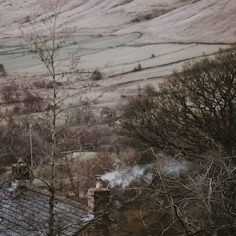
Maggie Freeman taught Creative Writing in Adult Community Learning in Essex until last year, when she moved to the edge of Epping Forest and decided to concentrate more on her own writing. Some of her short stories have been published in Stand, and her poems in Acumen. She has written three historical novels which are due to be republished later this year by Sapere Books (www.saperebooks.com). She wrote this story after an enjoyable week at Moniack Mhor, the Scottish writing centre.



The Girl in the Valley
Maggie Freeman
Lisa sits at the porthole window in her hallway and stares out. The stone wall of her house is thick, two foot thick at least, so the effect is like looking through a telescope at the valley – the golden gorse folding to the green fields where brown cattle graze, part-obscured by the rain. She can hear them low and the lapwings call, the rushing of the full stream – the familiar sounds of her hill assimilated over the years into the flow of her blood.
What is new – what is at the centre of her vision– is the new roof the new people are putting on the ruined cottage that sits on a ledge half way between her and the farm across the valley. Its roof trusses are triangles of timber so sharp that the pine of them glows through the dull days like a torch almost; and the carpenters working on them violate the quietness of her hill with the beat of their hammers, the thrust and retraction of their saws.
She has seen the new people have children. She has seen the little ones race in the fields like pixies in pointed hats, she has heard them scream with laughter as they leap across the stepping stones and slip in the water.
The Girl in the Valley – Maggie Freeman 2
She had a child once. Alastair said it was a hare but that wasn’t the truth. Children like to live outside, she said, but he said, nonsense. When she was a child she had liked to run outside but when she grew older Al had netted her, he had brought her indoors, taught her to prison her footsteps to floorboards and to drink Darjeeling tea from the fine bone china cups he’d inherited from his grandmother (cups so old that when cracked they’d been stapled with silver staples to make them watertight) – far removed from her cupped hands that let the cool spring water dribble between her fingers. In due course Al went back to work on the oil rigs and left her with the soft Aubusson carpets and the silk damask curtains drawn against the sun.
Who came to see her in her loneness? Not her parents, who’d gone to live in Castille. She had neither brother nor sister. She’d been home-schooled, and she had few friends: Alice, and the Famous Five, and Peggy and Titty out of Swallows and Amazons. That was until Alastair came along, he stood by the barbed wire fence at the edge of the lane, he was handsome and strong to pleasure her, and make her feel good. He crossed the fence. ‘This is how you make a child,’ he told her, resting on her belly. ‘Stay at home, and wait, and you will see.’
He must have been wrong, because a child never came.
So come the summer, having grown to like human contact, she ignored his admonitions to remain at home, and went out. She cycled to the little shops down by the main road on the far side of their hill and sold ice creams to tourists. Then when the days grew shorter a novelist with arthritic fingers (her favourite ice, passion fruit sorbet) summoned her to come twice a week to clip her hedges and cook light lunches for her and her friends.
With the pocket money Lisa earned she bought bulbs from the garden centre, which she planted in her and Al’s garden in vast clumps so gay that come spring Al was amazed by the daffodils and tulips that sprang out of the moist earth to make a bright display. Like a kind of children, Lisa thought. She rubbed her belly, wishing a child into it.
The Girl in the Valley – Maggie Freeman 3
Al lay on the rug and reached up to caress the calves of her legs. ‘You’re getting strong muscles,’ he said.
‘It’s all that cycling up the hill,’ said Lisa.
‘You’re happier now than you ever were before,’ he said, reaching to the top of her legs.
Lisa sighed with pleasure and sank to kneel astride him. She ducked her head to smother his face with kisses.
When the recession hit the oil industry Al was made redundant. He’d been with his company twenty years; he had a good payout. ‘No need to work for a while,’ he said. He wanted to share the contentment with simple things that Lisa had.
But he couldn’t be satisfied, he always knew how to do things better. He wouldn’t let Lisa take the shears to the novelist’s hedges as she’d been accustomed to do. Instead he bought an electric hedge-trimmer and cut the hedges himself, the buzz of the motor ringing in his ears. ‘See, it only takes an hour,’ he said. ‘I don’t know what you were making such a fuss about.’ But the sound of the hedge-trimmer had disturbed the novelist’s thoughts, and she told him, don’t come again.
Al bought a bike and took to cycling beside Lisa. ‘I love the wind in my hair,’ he said, coasting downhill. But coming back he wasn’t up to the strain and couldn’t help but lag behind her. She laughed at him over her shoulder, so he decreed that in future they’d take the Audi.
‘I’ll have to sell the bikes,’ he said. ‘We must get in the habit of being careful with money.’ What he got from them covered petrol costs for a while.
‘You don’t want to work any more,’ he told her. He had her give up her job. ‘It’s a waste of time. Not worth doing it for the piddling little amount you’re paid.’
‘But I like the old lady.’
‘She’s exploiting your labour. Have some respect for yourself.’
The Girl in the Valley – Maggie Freeman 4
The two of them day long in the big old house with its porthole window in the hall, its bay windows looking along the valley to the sea. ‘Sometimes I yearn for it,’ he’d say. ‘The strain and danger of it. Things are so quiet here.’ He’d sit in the great chair and she’d curl on his lap and he’d tell her of his work, the comradeship and support of the other men, the thrill of diving beneath the water.
‘But you don’t want to do it any more?’ she said.
‘No,’ he sighed, ‘I’m happy here with you.’
She grew accustomed to the way his brows drew together when his temper snapped.
In the autumn rain fell for days, drumming constantly on the porch roof; streams cut the gravel paths of the garden. In lulls in the weather Lisa would go out and comb them smooth with the rake.
Floods lay in the folds of the hills, the dark water glossed by the light of the sky. ‘When you go close you can see the drowned grass in the depths,’ said Lisa.
Al sniffed, and turned the page of his thriller.
Lisa rubbed her chest. She was drowning, she thought, she was being pressed under by the weight of Al’s constant presence. The demands he made on her, which she knew she could neversatisfy.
Then after Christmas the snow came. Oh, that was good. The valley light and white, hope and innocence tumbling waist deep in white flakes from the clouds. But it trapped Alastair more firmly within the thick stone walls of the house his crabbed tax inspector grandfather had left him, trapped him with his whisky bottle and his shaking hand and his need to control, and his faerie kind of wife whom he often regretted, so elusive and always slipping away from him, although all he wanted to do was share, like a good husband should– have a wee dram, my dear.
She stood in the porch. The icy wind bit her fair skin, it roared in her ears. She froze into it, melded into it.
The Girl in the Valley – Maggie Freeman 5
Alastair piled logs high on the fire and the heat made the blood rush to flush his face, it stifled him and he raged against being trapped in the valley. He hated the ridges of the surrounding hills, he hated the out-of-date prettiness of the room he was in, the soft almond of the carpet, the porcelain milkmaids on the mantelpiece. He longed for the free expanse of the North Sea and its unlimited gales and the bold companionship of the men he worked with, the swearing and the fellowship.
He went out on the porch. Have a wee dram, my dear.
No.
Yes.
No.
You ungrateful bitch. He jabbed the glass at her lips.
She cried out, and pushed his arm away.
Shaky as he was, he dropped the glass. ‘See what you’ve done now, you clumsy cow, that was precious, that glass, a family heirloom, an Indian fakir gave it to my great grandfather, if you ever let it break, he said, that’ll be the end of your line. A curse, or a blessing, whichever way you look at it. Now we can never have a child.’
The crystal had cracked into splinters on the stone flags and she was kneeling, trying to pick up the pieces, I want a child, she kept saying, a child will make everything worthwhile, I’ll fix the glass, I can fix it, I’ll fit the pieces together again, she murmured over and over, I’ll fix it, you can get glass glue, can’t you, Al, in the supermarket, you can, can’t you, as soon as the roads are clear? Small splinters had cut the skin of her knees and blood oozed into the long green of her skirt. Scarlet and green like her tulips. The blood dried dun as the hides of the cattle in the valley. She dashed the tears from her eyes with the back of her hand. ‘I must wash my knees,’ she said, and started up the stairs.
The Girl in the Valley – Maggie Freeman 6
He summoned her down again.
‘No. I won’t come.’ She stood at the top, hand on the newel post.
‘You’ll come if I say come.’ When she didn’t make a move towards him he hauled himself up the banisters hand over hand. He was three quarters of the way up when…
What happened? It’s difficult to say. The emergency services could not work it out when they arrived three days later. Lisa was unable to give a coherent account. Maybe her foot accidentally slipped on the top step and she fell on him, knocking him down. Or, he grabbed at her and pulled her down on top of him. Or, she hurled herself at him in a rugby tackle, straight as a spear. Or, not wanting to live with him any longer, she threw herself downstairs, and he was in her way. Whatever, it’s together that they tumbled down the stairs.
He lay still. His neck was at an odd angle. He’d stopped breathing.
Blood came out of his mouth, it flowed over her green skirt. It stained it. She would never wear it again.
She couldn’t believe he was dead.
She fetched a feather from a cushion, she laid it on his lips to see if he were breathing
There it still lay, three days later.
She paced around the house, upstairs and down, laid the palms of her hands against the window glass and wept. She covered his body with their feather quilt as if its warmth might make him live.
The telephone was dead. She picked it up and dialled, though that was not what she did, it was always Al who used the phone. She shouted into the mouthpiece. She held the receiver to her ear. But the line had been brought down by the weight of the snow.
The Girl in the Valley – Maggie Freeman 7
She put on Al’s thick jacket, the Arctic boots he wore when he was working on the rigs. Thick and bulky, they swamped her, his feet size twelves to her fives. She sidled past his body and waded out into the waist-deep snow. Down a step she couldn’t see. She fell; Al’s boots made her fall. Snow over her head. She pushed the snow away from her face, but she could not get to her feet again.
‘What happened?’ said the kind man with the helicopter who picked her up.
She didn’t know. ‘My leg hurts,’ she said plaintively. It never healed.
Lisa has inherited Al’s house and mostly she sits indoors as he wanted her to; though sometimes she’ll limp out with her stick to the stone bench at the front and sit at the top of the slope and watch the goings-on in her quiet valley, though they are few: the children in the newly-roofed house sent off by their mother to catch the school bus in the morning, coming home in the afternoon. The collie fetching the cows to be milked. The girl exercising her pony on a long rein.
She keeps so still on her bench that bumble bees buzz in the old roses beside her. Adders slither out of the undergrowth and sun themselves on the stone flags at her feet.